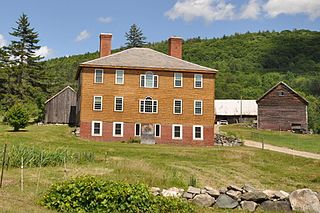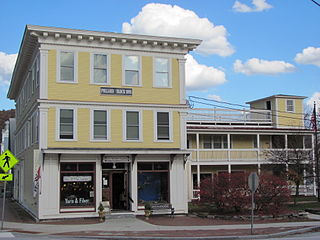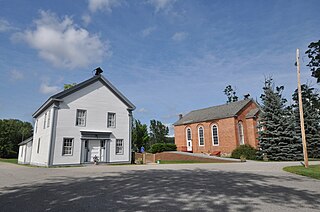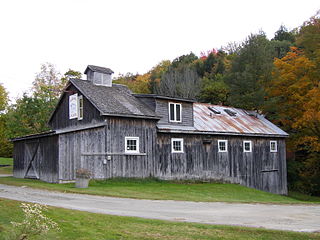
The Robert Frost Farm, also known as the Homer Noble Farm, is a National Historic Landmark in Ripton, Vermont. It is a 150-acre (61 ha) farm property off Vermont Route 125 in the Green Mountains where American poet Robert Frost (1874-1963) lived and wrote in the summer and fall months from 1939 until his death in 1963. The property, historically called the Homer Noble Farm, includes a nineteenth-century farmhouse and a rustic wooden writing cabin. The property is now owned by Middlebury College. The grounds are open to the public during daylight hours.

The Little Red Schoolhouse, also known as Briggs Schoolhouse, is a historic schoolhouse in Farmington, Maine. The one-room wood-frame schoolhouse was built in 1852, and originally stood on the Wilton Road at Red Schoolhouse Road. It served Farmington as the Briggs District school until 1958, and is one of the community's few surviving district school buildings. It was then used as a space for special needs students before being finally closed in 1969. It was moved the Franklin Agricultural Society fairgrounds on High Street in 2007. The building was listed on the National Register of Historic Places in 1972. It is open to the public during the annual Farmington Fair.

The Castleton Medical College Building, now known as the Old Chapel, is a historic building of the Castleton Medical College on Seminary Street in Castleton, Vermont, United States. Founded in 1818, it was the first medical college in Vermont, and the first private degree-granting medical school in the United States. The chapel-like building was built in 1821, and is now the oldest building on the campus of Castleton University. Its current use is for special meetings and performances for Castleton University. It was listed on the National Register of Historic Places in 1971.

The Welch Training School, also known as the Welch School, is a historic school building at 495 Congress Street in New Haven, Connecticut. Built in 1883, it is a good example of Queen Anne architecture as applied to school buildings, and was the city's first teacher training school. It was listed on the National Register of Historic Places in 1983. The building now houses a substance abuse clinic.

The Vernon District Schoolhouse No. 4 is a historic school building at 4201 Fort Bridgman Road in Vernon, Vermont. Built 1848, it is a well-preserved mid-19th century brick district school, which now serves as a local historical museum. It was listed on the National Register of Historic Places in 2005.

The Wait Block is a historic commercial building on Main Street in Manchester Center, Vermont. Built in 1884–85, it is a distinctive late example of vernacular Italianate design, executed in brick and marble. It notably survived the 1893 fire that devastated the village's business district. It was listed on the National Register of Historic Places in 1996.

The Wells Village School is a public school serving grades K through 6 in Wells, Vermont. Built about 1899, it is a fine and imposing local example of Colonial Revival architecture, designed to meet the latest school standards of the time. It was listed on the National Register of Historic Places in 1993.

The Beaver Meadow School is a historic school building at 246 Chapel Hill Road in Norwich, Vermont. Built in 1922, it is a rare late example of a one-room schoolhouse, made further distinctive by the survival of its original schoolroom interior. The building was listed on the National Register of Historic Places in 2013.

The Jeffrey House is a historic house on North Street in Chester, Vermont. Built in 1797, it is one of Vermont's small number of surviving Georgian style houses. It was built by the son of one of the area's early settlers, and originally served as a tavern. It was listed on the National Register of Historic Places in 1974.

The Locust Creek House Complex is a historic former tavern turned farmstead at 4 Creek Road in Bethel, Vermont. Built in 1837 and enlarged in 1860, it is a rare surviving example of a rural tavern in the state, with an added complex of agriculture-related outbuildings following its transition to a new role. The property was listed on the National Register of Historic Places in 1982. It now houses residences.

The Ludlow Graded School is a historic former school building at 10 High Street in the village of Ludlow, Vermont. Built in 1871–72, the school was for many years the primary school feeding the adjacent Black River Academy. The building now serves as a local senior services center. It was listed on the National Register of Historic Places in 1979.

The Wilcox-Cutts House is a historic house on Vermont Route 22A in Orwell, Vermont, USA. Its oldest portions date to 1789, but it is regarded as one of Vermont's finest examples of late Greek Revival architecture, the result of a major transformation in 1843. The house and accompanying farmland, also significant in the development of Morgan horse breeding in the state, was listed on the National Register of Historic Places in 1974.

The Pollard Block is a historic commercial building at 7 Depot Street in Cavendish, Vermont. Built in 1895, it is a fine local example of commercial Italianate architecture, and was home to the village general store for 70 years. It was listed on the National Register of Historic Places in 2008.

The School House and Town Hall is a historic municipal building on Schoolhouse Road, just west of United States Route 7 in the center of Leicester, Vermont. Built about 1858, it is a fine example of late Greek Revival architecture, and is the town's best-preserved district schoolhouse. Its upper floor has served as the town hall since its construction. It was listed on the National Register of Historic Places in 1988.

The Old Red Mill is a historic mill complex at Vermont Route 12 and Lovers Lane in southern Northfield, Vermont. Built in 1898, the building houses a nearly intact water-powered grain grinding mechanism from the period. It was listed on the National Register of Historic Places in 1977.

St. Albans Town Hall is the center of government of the town of St. Albans, Vermont. It is located at 579 Lake Road in the village of St. Albans Bay. It is a Richardsonian Romanesque building, constructed in 1898, two years after the city of St. Albans, the former town center, was politically separated. The building was listed on the National Register of Historic Places in 1996.

Woodbury Town Hall is center of town government of Woodbury, Vermont. It is located on the west side of Vermont Route 14 in the town's village center. Built in 1842, it is a well-preserved example of a vernacular Greek Revival municipal building. It was listed on the National Register of Historic Places in 1995.

The West Berkshire School is a historic school building at Berkshire Center and Mineral Brook Roads in Berkshire, Vermont. Built about 1820, it is one of the state's oldest surviving two-room two-story schoolhouses. It was used as a school until 1970. It was listed on the National Register of Historic Places in 1993.

McIndoes Academy is a historic school building on Main Street in the McIndoe Falls village of Barnet, Vermont. Built in 1853, it is a prominent local example of Greek Revival architecture, serving as a local high school until 1969. It was listed on the National Register of Historic Places in 1975.

The L.P. Jenne Block is a historic commercial-residential building at the junction of Vermont Route 105 and West Street in the village of Derby Center in Derby, Vermont. Built about 1870, it is a well-preserved example of a late-19th century general store. Now completely converted into residential use, it was listed on the National Register of Historic Places in 1998.























